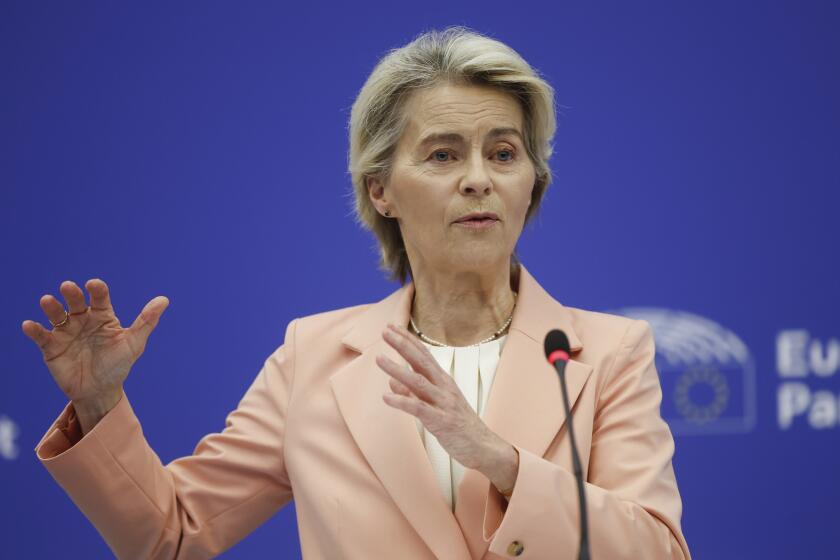Sharon Suffers a Mild Stroke, Is Hospitalized
Israeli Prime Minister Ariel Sharon was hospitalized Sunday night after suffering a minor stroke, hospital officials said, adding a fresh element of uncertainty to an already tumultuous political season in Israel.
Officials at Hadassah University Medical Center in Jerusalem said the 77-year-old prime minister was awake and speaking with family members and aides after undergoing tests. Officials said that, counter to initial reports on Israeli television, he did not lose consciousness.
Sharon remained in control of the government and received a military briefing at his bedside, said his spokesman, Raanan Gissin.
“He’s lucid, he’s in full control, fully conscious,” Gissin said.
Sharon’s office issued a statement early today saying he had a restful night and was in good condition. The statement said doctors would perform more tests today.
Haaretz newspaper reported on its website that Sharon had quipped to one of its reporters by phone Sunday, “I’m fine. Apparently I should have taken a few days off for vacation.”
The episode came a month after Sharon startled the political world here by breaking with the conservative Likud Party to form a new centrist movement. It is also in the middle of the campaign leading to Israeli national elections, set for March 28.
There was no immediate indication that Sharon’s health problems would prove serious enough to prevent him from continuing to serve as prime minister, a post he has held since 2001. But Sharon’s age and health could give voters pause when they go to the polls.
“It’s a wild card,” said Gideon Doron, a Tel Aviv University political science professor. “It’s going to affect the calculation, but I can’t tell you if it’s going to affect it immediately. It’s too early.”
Doron said Israelis would be watching to see if Sharon appeared back on the job soon. But he noted voters had elected leaders before with known health problems, such as former Prime Minister Menachem Begin.
Sharon’s new movement, Kadima, or Forward, holds a big lead in polls over its two main rivals, the left-leaning Labor Party and Likud. Recent polls showed Kadima likely to win about 40 of 120 seats in the Knesset, or parliament, with Labor capturing 20 to 25 and Likud trailing with about 12 to 15.
But if Sharon were to drop out, the contest would be thrown wide open. Under Israeli law, Vice Prime Minister Ehud Olmert, who also left Likud for Kadima, would take over as national leader if Sharon were unable to serve. Kadima would have to select someone to serve as party chief and candidate for prime minister, but the new movement was built solely around Sharon.
Labor is now led by Amir Peretz, a fiery former union leader who is making his first foray into national politics. Likud chooses its leader today in a primary with two main contenders: former Prime Minister Benjamin Netanyahu and Foreign Minister Silvan Shalom. Netanyahu, who had been Sharon’s chief rival in Likud, has been favored in polls.
Yuval Weiss, a deputy director at Hadassah Hospital, told reporters Sunday night that Sharon’s immediate treatment required no invasive procedures and that the prime minister would be kept for observation and released soon. He did not elaborate.
Sharon’s personal physician, Boleslaw Goldman, said the prime minister had suffered “no damage” and would be released in a few days, Associated Press reported.
Sharon, who is severely overweight, was rushed to the hospital about 8 p.m. after telling his son, Gilad, by telephone that he did not feel well, according to Israeli television. The elder Sharon, who was riding in a car between Jerusalem and Tel Aviv at the time, was diverted immediately to the hospital and ushered into its highly regarded trauma ward, according to the television reports.
As news of Sharon’s hospitalization spread, Palestinian Authority President Mahmoud Abbas, Egyptian leader Hosni Mubarak and U.S. officials sent get-well greetings, according to Israeli media, and Palestinian gunmen in the Gaza Strip fired into the air in jubilation that the Israeli leader had taken ill.
Sharon, a former general known as “the bulldozer” for his willful manner and as the longtime leader of the effort to build Jewish settlements in the West Bank and Gaza Strip, has endured a turbulent tenure of nearly five years as premier.
The Palestinian intifada erupted in September 2000 immediately after he paid a controversial visit to a contested holy site in Jerusalem, and the uprising has kept Palestinians and Israelis mired in nearly steady violence since Sharon was elected early the following year. That conflict, including dozens of suicide bombings by Palestinian militants and punishing reprisals by Israel’s military, has claimed about 1,000 lives on the Israeli side and more than 3,300 on the Palestinian side.
In late 2003, Sharon unveiled his plan to begin separating from the Palestinians by withdrawing to what he called more defensible boundaries. He later chose to begin that effort by evacuating all 21 Jewish communities in the Gaza Strip. That proposal outraged former admirers in the settlement movement and sparked concerns that Sharon might become the target of right-wing extremists or that Israel would descend into civil war.
Displaying trademark stubbornness and skillful tactical maneuvering, Sharon won one bruising political battle after another and even recruited Labor to join his government to gain approval for the withdrawal, which was expanded to include four West Bank settlements.
The evacuation this summer went smoothly, but Sharon’s turnabout alienated his former base in Likud and left him almost constantly at odds with right-wing members who attacked him as a traitor. Sharon bolted from Likud, the party he helped found, saying he could no longer rule effectively -- or carry out moves aimed at setting Israel’s permanent borders -- as long as he faced such resistance in his own party.
Sharon has said his new party, which he stacked with more than a dozen former members of Likud and some Labor figures, including former Prime Minister Shimon Peres, is open to compromise with the Palestinians as long as they act to rein in militants.
The Palestinian political situation is also in flux. Palestinians go to the polls next month to select a new parliament in a race that for the first time includes the militant group Hamas.
The long-dominant Fatah party once led by Yasser Arafat has found itself beset by voter discontent over years of corruption and mismanagement within the Palestinian Authority.
Last week, a group of the movement’s so-called young guard, resentful of cronyism among the Fatah leadership, submitted its own slate of candidates, topped by Marwan Barghouti, the popular uprising leader serving five life terms in an Israeli prison.
Efforts to unify the registered slates since then have proved elusive because of election law that prevents names from being added to any list.
But a Fatah official on the breakaway list said Sunday that the two factions had agreed to join in a unified Fatah bloc after the election in hopes of preventing Hamas from achieving control of parliament.
More to Read
Sign up for Essential California
The most important California stories and recommendations in your inbox every morning.
You may occasionally receive promotional content from the Los Angeles Times.










